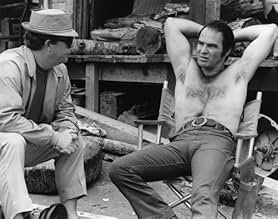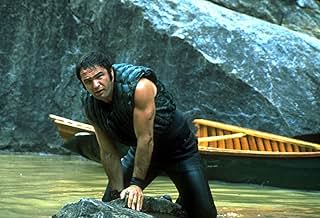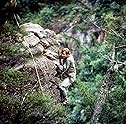Con la intención de ver el río Cahulawassee antes de que sea embalsado y convertido en un lago, el fanático de las actividades al aire libre Lewis Medlock lleva a sus amigos a un viaje en ca... Leer todoCon la intención de ver el río Cahulawassee antes de que sea embalsado y convertido en un lago, el fanático de las actividades al aire libre Lewis Medlock lleva a sus amigos a un viaje en canoa que nunca olvidarán.Con la intención de ver el río Cahulawassee antes de que sea embalsado y convertido en un lago, el fanático de las actividades al aire libre Lewis Medlock lleva a sus amigos a un viaje en canoa que nunca olvidarán.
- Nominado a 3 premios Óscar
- 2 premios ganados y 14 nominaciones en total
Opiniones destacadas
Unlike many other films, which are disturbing either by dint of their naked unpleasantness (Man Bites Dog) or their sheer violence (most Peckinpah films), Deliverance shocks by its plausibility. Certainly, the buggery scene is pretty straightforward in its unpleasantness, but the film's effect derives far more from its slow build-up and the tangible sense of isolation surrounding the four leads, both before and after everything starts to go wrong. The moment when the canoes pass under the child on the bridge, who does not even acknowledge the men he had earlier played music with, let alone show any sign of human affection towards them, is among the most sinister in modern film. The tension increases steadily throughout the canoe trip, and perseveres even after the final credits - the ending makes the significance of the characters' ordeals horrifically real. The movie's plausibility is greatly aided by the playing of the leads, particularly Ned Beatty and Jon Voight as the victim and reluctant hero respectively. Burt Reynolds, too, has never been better. The film's cultural influence is demonstrable by the number of people who will understand a reference to 'banjo territory' - perhaps only Get Carter has done such an effective hatchet-job on a region's tourist industry. I can think of only a handful of movies which put me into such a serious depression after they had finished - the oppressive atmosphere of Se7en is the best comparison I can think of. Although so much of it is excellent of itself, Deliverance is a classic above all because there are no adequate points of comparison with it - it is unique.
I first saw this on a vhs in the 90s, then on a vcd in 2006 n finally on a blu-ray. It's an extremely disturbing film especially the scene with Ned Beatty. One of the best backwoods/survival film of all time.
The film's awesome scenery, the sounds of birds, reptiles n insects n the gushing wild rivers combined with the absence of civilization are characters themselves.
We get to see Jon Voight doing some daredevil rock climbing and Burt Reynolds in his sleeveless t shirt flaunting biceps.
John Boorman has created one of the best movies based on James Dickey's novel. Indeed an influential movie. The banjo scene n the music is terrific.
I hadn't seen this movie in at least 20 years, but in the last few, it had started to itch away at my mind. I thought it terrific when I first saw it, but had I missed something even so? Was it more than just a disturbing adventure movie, in which city people run afoul of backwoodsmen?
So as soon as I saw the DVD, I bought it, even though it was obviously another Warner Bros. rush-it-out, never-mind-the-extras job.
The movie isn't as good as I remembered -- it's better. Those who are looking for a RIVER WILD thriller, or a SOUTHERN COMFORT (a DELIVERANCE imitation) suspense movie, are already looking in the wrong place. This movie is about what goes on inside people much more than it is about what goes on >around< them.
I've seen comments here suggesting that Ned Beatty doesn't show enough reaction after being brutally raped. Huh? He's stunned for ten minutes, then tries to attack Bill McKinney's >corpse<. He's still rattled the last time we see him in the movie, when he tells Jon Voight that they won't be seeing each other for a while. (Which clearly means forever.) Beatty's life has been changed; he'll never get over it.
So has Voight's, but in a different way. For the first time, I noticed that >three< people get into the tow truck when Reynolds hires those brothers to drive their cars to the canoeist's destination. Sure, that's logical -- there are three vehicles to drive initially, after all. But why does Boorman take pains to avoid showing us the face of the third person in the tow truck, but does show him fingering the gun in the rear window of the truck?
Could it be because this guy turns up later? Is he Bill McKinney's character? Or the Toothless guy? Or the guy Voight kills? Which of course raises the most important questions in the movie: WAS Ronny Cox shot? And if he was, was the guy Voight kills the one who shot him? (And was Voight's victim the Toothless guy?) On an initial viewing of the movie, all this seems pretty obvious: yes, Cox is shot; yes, Voight kills the right person, the Toothless guy.
But then what about the man we later learn has gone hunting but who hasn't returned? Why is Voight so shocked when he looks into the mouth of his victim? Boorman and Dickey give great weight to the scene in which Voight fails to kill a deer. (Even if he had, it would have been a foolish, wasteful act.) The interplay between Voight and Reynolds is also very interesting; Voight clearly admires Reynolds on some levels, while finding him disgusting on others.
Dickey is primarily a poet, secondarily a novelist; it's not hard to believe that he intended all four men to represent different aspects of the human condition. DELIVERANCE is one of the most intricately ambiguous movies of its type ever made; it cannot be pulled apart into easily-understood sections, and where our sympathies should lie is never obvious. Even the sheriff, played by Dickey himself, has darker shadings that are partly inexplicable. And there is that shot of the removal of the graves; it's not in there by chance or for local color.
On the surface, DELIVERANCE seems to be an exciting, disturbing adventure -- and it is that. But just like the secrets the lake conceals, there's a great deal more beneath the surface of DELIVERANCE.
So as soon as I saw the DVD, I bought it, even though it was obviously another Warner Bros. rush-it-out, never-mind-the-extras job.
The movie isn't as good as I remembered -- it's better. Those who are looking for a RIVER WILD thriller, or a SOUTHERN COMFORT (a DELIVERANCE imitation) suspense movie, are already looking in the wrong place. This movie is about what goes on inside people much more than it is about what goes on >around< them.
I've seen comments here suggesting that Ned Beatty doesn't show enough reaction after being brutally raped. Huh? He's stunned for ten minutes, then tries to attack Bill McKinney's >corpse<. He's still rattled the last time we see him in the movie, when he tells Jon Voight that they won't be seeing each other for a while. (Which clearly means forever.) Beatty's life has been changed; he'll never get over it.
So has Voight's, but in a different way. For the first time, I noticed that >three< people get into the tow truck when Reynolds hires those brothers to drive their cars to the canoeist's destination. Sure, that's logical -- there are three vehicles to drive initially, after all. But why does Boorman take pains to avoid showing us the face of the third person in the tow truck, but does show him fingering the gun in the rear window of the truck?
Could it be because this guy turns up later? Is he Bill McKinney's character? Or the Toothless guy? Or the guy Voight kills? Which of course raises the most important questions in the movie: WAS Ronny Cox shot? And if he was, was the guy Voight kills the one who shot him? (And was Voight's victim the Toothless guy?) On an initial viewing of the movie, all this seems pretty obvious: yes, Cox is shot; yes, Voight kills the right person, the Toothless guy.
But then what about the man we later learn has gone hunting but who hasn't returned? Why is Voight so shocked when he looks into the mouth of his victim? Boorman and Dickey give great weight to the scene in which Voight fails to kill a deer. (Even if he had, it would have been a foolish, wasteful act.) The interplay between Voight and Reynolds is also very interesting; Voight clearly admires Reynolds on some levels, while finding him disgusting on others.
Dickey is primarily a poet, secondarily a novelist; it's not hard to believe that he intended all four men to represent different aspects of the human condition. DELIVERANCE is one of the most intricately ambiguous movies of its type ever made; it cannot be pulled apart into easily-understood sections, and where our sympathies should lie is never obvious. Even the sheriff, played by Dickey himself, has darker shadings that are partly inexplicable. And there is that shot of the removal of the graves; it's not in there by chance or for local color.
On the surface, DELIVERANCE seems to be an exciting, disturbing adventure -- and it is that. But just like the secrets the lake conceals, there's a great deal more beneath the surface of DELIVERANCE.
"Deliverance" is based on a novel by American author James Dickey, of the same title. Four men who are friends plan a weekend in the outdoors from their families and jobs in the city. The setting is in Georgia, and they are going to canoe one of the roughest rivers to get to and to ride.
Only this adventure turns into a psychological nightmare. It's a griping ride down a fast and narrow river gorge. But the rapids and falls aren't the worst dangers. This is a story and film that one won't forget years after watching it. It's not for everyone. Even some who enjoy intrigue and mystery may find "Deliverance" unsettling.
It's definitely not for children, teens included. People who can readily distinguish reality from fiction and can easily move on beyond the latter, would be those most likely to appreciate this movie.
Only this adventure turns into a psychological nightmare. It's a griping ride down a fast and narrow river gorge. But the rapids and falls aren't the worst dangers. This is a story and film that one won't forget years after watching it. It's not for everyone. Even some who enjoy intrigue and mystery may find "Deliverance" unsettling.
It's definitely not for children, teens included. People who can readily distinguish reality from fiction and can easily move on beyond the latter, would be those most likely to appreciate this movie.
I think one of the words that most describes the events in this film to me is brutal. When I saw this as a young lad, I felt the isolation of the four characters, cut-off from the world they are used to and thrown into a brutal world where nature is harsh (the rocks and canyons along the river always scare me) and the local folk are a complete world away. The film still scares the sh*t out of me! I mean, what would YOU do if you were confronted by two hill-billies in a situation like that?
It's so easy to remain distant and see the film as "entertainment", but take a reality-check and immerse yourself in the story. It's a shame some just don't appreciate the film - guess we're used to adrenaline-pumping action from start to finish nowadays, but that's too easy - it doesn't require emotional involvement from the viewer unlike a film such as Deliverance...
It's so easy to remain distant and see the film as "entertainment", but take a reality-check and immerse yourself in the story. It's a shame some just don't appreciate the film - guess we're used to adrenaline-pumping action from start to finish nowadays, but that's too easy - it doesn't require emotional involvement from the viewer unlike a film such as Deliverance...
¿Sabías que…?
- TriviaWhile filming the white water canoeing scene, Ned Beatty was thrown overboard and was sucked under by a whirlpool. A production assistant dove in to save him, but he didn't surface for thirty seconds. Sir John Boorman asked Beatty, "How did you feel?," and Beatty responded, "I thought I was going to drown, and the first thought was, how will John finish the film without me? And my second thought was, I bet the bastard will find a way!"
- ErroresWhen the cedar strip canoe breaks in half ((01:02:35), it breaks cleanly, indicating it was previously cut. It would have split, splintered and hinged together by the canvas skin.
- Créditos curiososThe end credits only show the cast and a notice of where the location of the film was shot and the special thanks, which rolls over a shot of Ed and his wife laying down trying to sleep. It also shows the shot of the lake where the hand ascended up out of the water and the final credit reads 'Distributed by WARNER BROS'
- Versiones alternativasThe original UK cinema version suffered minor BBFC cuts, including the removal of two lines of dialogue said by the toothless man when threatening Ed after the rape scene, "He got a real pretty mouth, ain't he?" and "You got to do some praying for me, boy, you better pray real good." Also, the death of the mountain man where he is seen struggling with the arrow through his chest was reduced. All later video releases were uncut.
- ConexionesEdited into La classe américaine (1993)
- Bandas sonorasDuelling Banjos
Written by Arthur Smith (uncredited)
Arranged and played by Eric Weissberg, Steve Mandell
Selecciones populares
Inicia sesión para calificar y agrega a la lista de videos para obtener recomendaciones personalizadas
Detalles
Taquilla
- Presupuesto
- USD 2,000,000 (estimado)
- Total a nivel mundial
- USD 4,550
- Tiempo de ejecución
- 1h 49min(109 min)
- Color
- Relación de aspecto
- 2.35 : 1
Contribuir a esta página
Sugiere una edición o agrega el contenido que falta
































